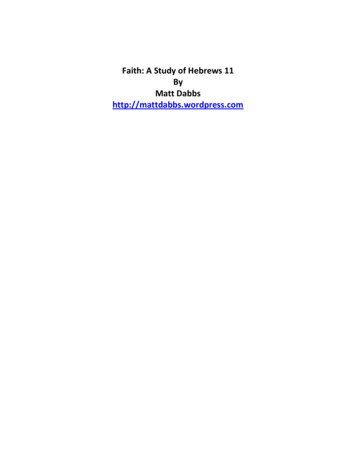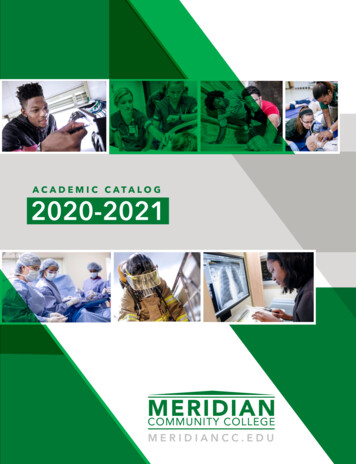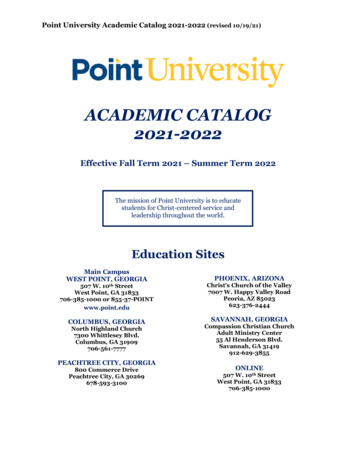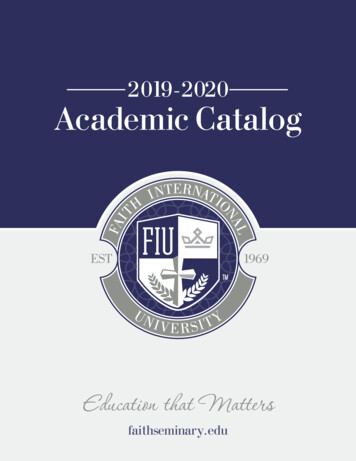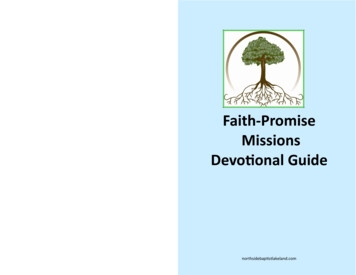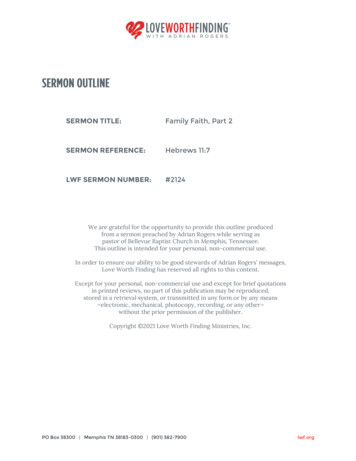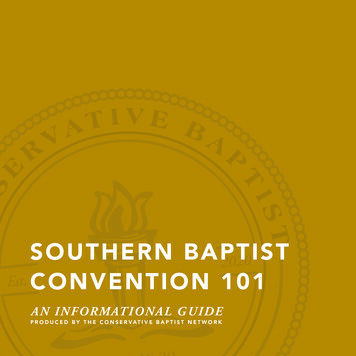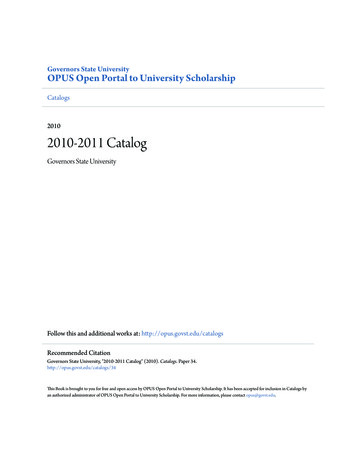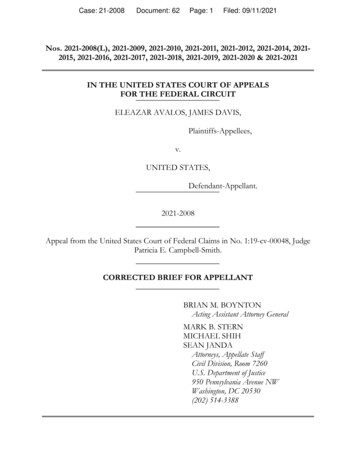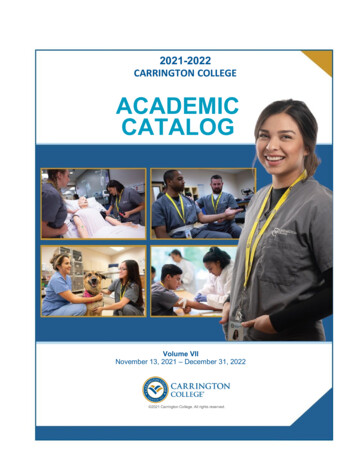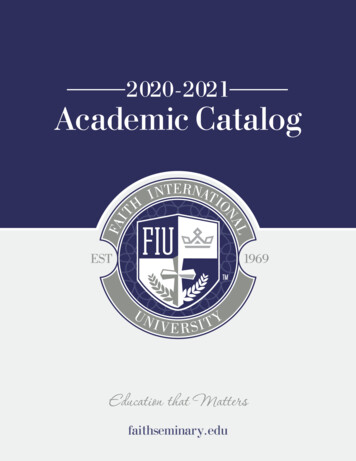
Transcription
2020-2021Academic CatalogEducation that Mattersfaithseminary.edu
1FAITH INTERNATIONAL UNIVERSITYFAITH SEMINARY GRADUATE SCHOOL2020-2021 Academic CatalogFaith International University (FIU) is an accredited member of the TransnationalAssociation of Christian Colleges and Schools (TRACS), a National Faith-related accreditingagency recognized by the United States Department of Education (ED) and the Council forHigher Education Accreditation (CHEA).Faith International University is authorized by the Washington Student Achievement Council(WSAC) and meets the requirements and minimum educational standards established fordegree-granting institutions under the Degree-Granting Institutions Act. This authorization issubject to periodic review and authorizes FIU to offer specific degree programs. The Councilmay be contacted for a list of currently authorized programs. Authorization by the Councildoes not carry with it an endorsement by the Council of the institution or its programs.Any person desiring information about the requirements of the act or the applicability ofthose requirements to the institution may contact the Council at P.O. Box 43430, Olympia,WA 98504-3430 or by email at degreeauthorization@wsac.wa.gov.Faith International University3504 North Pearl StreetTacoma, Washington 98407-2607Local 253.752.2020Toll-free 888.777.7675Academic Year 2020-2021Catalog Vol. 51 / No. 1 / July 1, 2020DISCLAIMERFaith International University (FIU) has published the 2020-2021 academic catalog for informational purposes andmakes a reasonable effort to provide accuracy in the contents. FIU assumes no legal liability or responsibility for theaccuracy, completeness, or usefulness of any information provided by this service. The catalog is not representedto be error free. Although students are governed by the catalog that is in effect in the academic year in whichthey enter, nothing contained herein constitutes nor is intended to constitute an offer, inducement, promise, orcontract of any kind for any potential, current, or former student. No warranties are either expressed or implied.The Governing Board reserves the right to revise, delete, or cancel at any time without prior notice, (including,but not limited to) programs, curricula, modes of delivery and instruction, academic courses and calendars,standards, tuition, fees, schedules, graduation, or other such matters as may be within its control. In the eventthat FIU determines to make a substantial change in any area, students will be advised as promptly as possible.
2TABLE OF CONTENTSOverview of Faith International UniversityLetter from the PresidentHistory, Purpose & PhilosophyMission StatementBiblical Code of ConductDrug & Alcohol PolicyGeneral Information, Curriculum & AccreditationInternational Programs & Governing BoardFaculty & StaffDoctrinal Statement3-2134-5567-1112-141516-1920-21Academic Programs 23-53Bachelor’s ProgramsGraduate Certificate in LeadershipMaster’s ProgramsDoctoral Programs24-3132-3334-4546-53Admissions Information 55-59Admissions Requirements and Applications DeadlinesDisability ServicesFederal Financial Aid In-School DefermentInternational (Nonimmigrant) Students & I-20Transfer Credit5558845859Academic Policy 61-77RegistrationSatisfactory Academic Progress (SAP)Graduation RequirementsTranscript RequestsResidency Requirements6164717375Financial Information 80-94Tuition & FeesFederal Financial AidVeterans Benefits80-8182-9394Course Descriptions 96-148GraduateUndergraduate95-124125-148Consumer Information 150-163Personal Safety & Campus Crime InformationFamily Educational Rights & Privacy Act (FERPA)Student Rights & ResponsibilitiesCopyright Infringement Policies / Sanctions150-156157162163Location & Facilities 165Academic Calendar 166-167Contact Information 168-169Index 173-174
3Dr. Michael J. AdamsThroughout the pages of this catalog we hope to introduce you to a Bible‑centered institution ofChristian studies. Our uniqueness as an interdenominational university and seminary is readilyapparent. Our primary goals are to academically educate and practically equip Christian disciplesfor various professional vocations and ministries. Our vision to serve the greater evangelicalcommunity has created a diverse student body that offers a vibrant learning environment.Our partnerships with local, national, and international churches and organizations provide additionalopportunities for leadership and practical ministry development.Faith International University is committed to historic, biblical Christianity. We steadfastly upholdthe inerrancy of Holy Scripture and accept as truth and without reservation all matters aboutwhich the Bible speaks. We believe it is imperative to possess a faithful understanding of God’s Wordand to apply its message in all aspects of life. Therefore, we are committed to the disciple-makingministry of the global/local church. As proof of this, our graduates are serving as pastors, chaplains,missionaries, administrators, teachers, counselors, coaches, and worship leaders. In addition toserving Church ministries, our graduates are bringing the Gospel directly to the marketplace, includingthe business and sports world.Our faculty members are well-known in their academic disciplines and are diligently involved in theapplied ministry of the church. Therefore, they are dedicated to a learning experience that involvespractical ministry and spiritual growth combined with a rigorous academic curriculum.Our programs are offered in resident study as well as through the convenience of resident-hybridcourses and online/distance education. Students who have vocational and family responsibilities willfind these various methods of instruction very helpful.Pursuing a biblical and theological education is an important decision. Whatever your calling in life,we know that as you pursue your personal and professional goals at Faith International University youwill be rewarded with a theological, biblical, and practical base of knowledge that will enhance yourability to lead with faithfulness, humility, intelligence, and wisdom to the glory to God.Welcome to the community of “faith.” May God bless you richly in your studies.In the furtherance of the Gospel,FA IT H I NTE R NAT I O NA L U N IVE R S ITY AC A D E M I C C ATA LO G 2 0 2 0 - 2 0 2 1FROM THE PRESIDENT
4H I STO RY & P U R P O S EHISTORYFaith International University (FIU) was founded in 1969 as Faith Evangelical Lutheran Seminary by Lutherans Alert-National(LAN), an organization committed to biblical inerrancy. In 1968, LAN was commissioned to investigate possible avenuesof proclaiming historic, biblical theology since a significant part of the Lutheran Church was moving toward liberalism.LAN eventually recommended the establishment of a seminary committed to the inerrant Word of God. TheRev. Dr. R. H. Redal was called as the first president and initial classes were held September 23, 1969, in Tacoma,Washington. The institution began an accreditation process in 1996 with a U.S. Department of Education (ED) approvedagency, the Transnational Association of Christian Colleges and Schools (TRACS), and was granted candidacy status in1998 and full accreditation in 2001. The name of the institution was changed to Faith Evangelical Seminary in 2005 with“College” added in 2010 to accurately represent the interdenominational character of the institution as well as the level ofprograms offered. In 2006, the Rev. Dr. Michael J. Adams was appointed as the second president. In 2016, the name of theinstitution was changed to Faith International University to reflect the institution’s international outreach, undergraduate andgraduate degree programs, and its five schools of academic emphasis: Religion, Education, Leadership, Discipleship andApplied Studies, and Counseling and Care.PURPOSE & OBJECTIVESFaith International University is committed to stated objectives and to continually measure its effectivenessthrough assessment by students, alumni, and employees in order to ensure both the fulfillment of stated objectives andthe continual improvement of the institution. The objectives are pursued through the development of a communityof Christian teachers and students who seek to strengthen their beliefs by exegeting and interpreting Scripture, whouphold doctrines expressed in the historic creeds and confessions of the Church, and who labor together in fellowshipto proclaim the Gospel of Jesus Christ. The instititution is committed to the following:1. Institutional IntegrityFIU is committed to Christian integrity in all aspects of the institution. This is accomplished by affirming that theinerrant Word of God informs and guides the institution’s academic programs and institutional operations.2. Academic ExcellenceFIU is committed to academic excellence and promotes scholarly discipline and inquiry. This is accomplished bydefining the most important academic goals and competencies for students to achieve, by assessing those goals andcompetencies, and by using assessment results to improve the academic experience.3. Spiritual TransformationFIU is committed to encourage each student to grow in the love of Christ and to be transformed by the renewing of themind. This is accomplished through devotional and academic contact with the Word of God, consistent prayer, collegialfellowship, discipleship, and the integration of faith and learning leading to Gospel proclamation and incarnationalChristian service to the body of Christ.4. Missional OutreachFIU is committed to train students with the skills required for the persuasive communication of the Gospel throughmissional ministry in the contemporary world and to instill Christ-like attitudes that will assist them as they carryout the “Great Commission” in a culturally diverse world both locally and globally. This is accomplished through acurriculum that promotes academic learning coupled with the practical application of God’s Word.FIU provides facilities, guidance, and instruction for undergraduate and graduate study and grants certificates and degreesthat testify to educational readiness in order for students to pursue or supplement vocational opportunities in both theChurch and the marketplace.
PHI LOSOPHY & MI SS IONCommitment to and Relevance of the ScripturesThe institution is committed to the authority of the inerrant Scriptures. From this firm commitment to God’s inspired,authoritative, and written revelation stems a system of doctrine in which the great truths of the Christian faith are affirmedand expounded. The Bible is God’s written revelation and record of His nature, work, and purpose and applies to all menand women in every age, culture, and walk of life. The Bible is the starting point of all rational inquiry, the guide to allinterpretation of reality, and the “last word” on all issues pertaining to God’s will for humanity. Every learning experience,course, department, and degree program must relate to a commitment to scriptural authority.Theological PositionThe theological position of the institution is centered around the Christian Gospel, that is, Jesus Christ, virgin born and Godincarnate, who accomplished our redemption through the substitutionary shedding of His blood and sacrificial death onthe cross. The educational philosophy is based on this biblical foundation and built within this confessional framework. Theinstitution is an interdenominational, nonprofit, religious, and educational institution that respects the right of studentsto affiliate with the denomination or synod of their choice. Students with ties to a denomination, association, or synod havean option to choose various courses that emphasizes their theological perspective. The institution reserves the rightto determine whether or not a denomination or synod falls under the guidelines of Christian orthodoxy (page 56,Rights of Admission & Enrollment).Dependence on God’s Gifts of GraceSince communication of God’s truth is a divine-human process in which the instructor seeks to minister God’s truths to andin the lives of students, instructors and students need to depend on God in the teacher-learning process. The divine-humanprocess adds an essential spiritual dimension and dynamic to the institution’s curriculum and provides a unique classroomclimate and a distinctive theological education.Student and Faculty InteractionInstructors are to be concerned for each student’s academic pursuit of knowledge and wisdom in biblical, theological,and applied ministerial disciplines and are to actively involve their students in the education and discipling process. This isaccomplished through numerous means such as lectures, note-taking, discussions, reports, research projects, exegeticalpapers, examinations, readings, and faculty-student dialogues. These means, coupled with practical training activitiesincluding discipleship mentoring, field ministry, practicums, and internships, help foster maximum learning in a Christianacademic environment.M I S S I O N STATE M E NT“Faith International University exists to glorify Godby equipping Christian discipleswith a biblical, theological, and practical educationempowering them to apply and proclaimthe inerrant Word of God for world-wide Christian service.”FA IT H I NTE R NAT I O NA L U N IVE R S ITY AC A D E M I C C ATA LO G 2 0 2 0 - 2 0 2 1EDUCATIONAL PHILOSOPHY5
6CONDUCTBIBLICAL CODE OF CONDUCTFaith International University is a community of Christian believers who confess and follow Jesus Christ as Lord and Savior.The community is expected to uphold the Word of God and apply biblical standards of morality and integrity in life. Studentsare expected, therefore, to conduct themselves in a manner in keeping with Christian decorum and testimony. This involvesembracing attitudes and actions the Bible identifies as virtuous and avoiding attitudes and actions the Bible identifies assinful. Students are required to abide by all published policies, codes, and regulations prescribed by the institution. Studentsalso should abide by applicable local, state, and federal laws. The institution reserves the right to require disciplinary actionof students whose behavior is in conflict with the Biblical Code of Conduct.According to the Word of God, followers of Christ are expected to: Manifest the fruit of the Spirit such as “love, joy, peace, patience, kindness, goodness, faithfulness, gentleness, andself-control” and “put on compassion, kindness, humility, meekness, long-suffering, bearing with one another andforgiving one another” (Gal. 5:22‑23; Col. 3:12-14). Seek righteousness, mercy, and justice, and love what is good and detest what is evil (Prov. 21:3, 31:8-9; Amos 5:15;Micah 6:8; Matt. 23:23; Rom. 12:9, 16:19; Gal. 6:10). Uphold the God-given worth of human beings, from conception to death, as the unique image-bearers of God; anduphold chastity and the sanctity of marriage, defined biblically as the covenant union between a man and a woman(Gen. 1:27, 2:24; Ps. 139:13-16; 1 Cor. 6:18; Heb. 13:4). Live in Christian liberty and practice wise stewardship of mind, body, time, abilities, money, and possessions(Gal. 5:13-14; 1 Pet. 2:16-17). Be accountable to a local church or pastor, and live a peaceful, prayerful, and Godly life (1 Thess. 4:11, 5:17-18;Heb. 10:25; 1 Tim 2:2; Titus 2:7-8; James 5:16). Be humble people of integrity whose word is trustworthy, who witness for the Gospel, practice good works, andresolve inter-personal or corporate conflicts, grievances, or disputes in a biblical manner only (Ps. 15:4; Matt. 5:24,5:33-37, 18:15-17; Acts 1:8; 1 Cor. 6:1-8; Gal. 6:10; Eph. 2:10, 4:31-32; Heb. 10:24; 1 Pet. 2:11, 3:15).According to the Word of God, followers of Christ are expected to abstain from: Blasphemy, lying, stealing, dishonesty, slander, gossip, greed, vulgarity, murder, hypocrisy, covetousness,self-righteousness, arrogance, immodesty, inappropriate dress, and illegal activities (Prov. 16:18; Exod. 20:7; Deut.22:5; Matt. 16:6, 23:13-36; Acts 15:5-11; Rom. 13:1-2, 13:9; 1 Cor. 6:10; Gal. 3:26‑29; Col. 3:8-9; 1 Tim. 2:8-10; Heb.13:5-6; James 2:1-13). Sinful attitudes and behaviors such as “sexual immorality, impurity and debauchery, idolatry, witchcraft, hatred,discord, jealousy, fits of rage, selfish ambition, dissensions, factions, envy, drunkenness, orgies, and the like”(Gal. 5:19-21). Adultery, lust, fornication, homosexual behavior (page 171 - RCW 26.04), and all other sexual relations outside thebounds of God-sanctioned marriage (Lev. 18:22, 20:10-17; Matt. 5:27‑28; Rom. 1:21-27; 1 Cor. 6:9-10; Eph. 5:3-5;Col. 3:5; 1 Tim. 1:10).
D R U G & ALC O H O L P O LI CYThe possession, sale, and/or use of any drug identified as a controlled substance or as illicit as defined under United Statesfederal law is prohibited on the campus of the institution or at any off-campus function sponsored by the institution.Alcohol is prohibited on the campus with the exception of wine used for an approved worship service incorporating HolyCommunion—but only with prior permission from the President or Executive Vice-president. The institution administersthe following Drug and Alcohol Policy in compliance with the Drug Free Schools and Communities Act Amendment of 1989(Public Law 101-226):1. Unlawful possession, use, or distribution of illicit drugs or alcohol by students on its property or as part of any of itsactivities is specifically prohibited and is a violation of local, state, and federal laws. The institution will observe alllocal, State, and federal laws relating to drug and alcohol abuse, including referral to local authorities for arrest orprosecution. The courts will determine penalties for violations of these laws.2. Any student convicted, including a guilty plea or plea of nolo contendere, by a court of law of being under the influenceof illicit drugs or of illicit possession or distribution of drugs, on- or off-campus, is sufficient cause for a minimumone-year suspension. Professional counseling during the suspension period may be required as a condition for futureenrollment. A subsequent offense of the same nature during the suspension period is sufficient cause for terminationof enrollment after due process.3. Any student convicted, including a guilty plea or plea of nolo contendere, by a court of law of being under the influenceof alcohol or of illicit possession or distribution of alcohol on- or off-campus, is sufficient cause for a minimum oneyear suspension. Professional counseling during the suspension period may be required as a condition for futureenrollment. A subsequent offense of the same nature during the suspension period is sufficient cause for terminationof enrollment after due process.4. Any student arrested for unlawful use, possession, or distribution of illicit drugs or alcohol, on- or off-campus, maybe placed on probation until resolution of any court proceeding. Upon conviction, including a guilty plea or plea ofnolo contendere, FIU will observe the above-referenced provisions.The primary intent of the Drug and Alcohol Policy is to be preventative and remedial. Faith International University providesreadily available information about the physical and psychological dangers of drug and alcohol abuse in publications suchas the Academic Catalog, Student Handbook, and Employee and Faculty Handbooks. In addition, institutional regulationsabout drugs and alcohol are addressed during orientation. The institution can, upon request, provide referrals for a studentor employee struggling with or addicted to drugs or alcohol. The Drug Free Schools and Communities Act Amendmentrequires that “a description of the applicable legal sanctions under local, state, or federal law for the unlawful possessionor distribution of illicit drugs and alcohol” be available.Note: While the institution recognizes that RCW 69.50 et seq. and RCW 69.51A et seq. are now state law, these state lawsdo not repeal or modify federal laws.The school desires to assist any student to obtain pertinent information on drug abuse or to enter an appropriate, medicallysupervised treatment program. Violation of these standards by any student will be reason for mandatory evaluation and/ortreatment for a substance abuse disorder or for disciplinary action up to, and including, dismissal from school. The intent ofthis program and participation by the school is to be preventative and remedial. Students are subject to the school’sdisciplinary action and referral to local authorities for violation of the school’s drug policy.FA IT H I NTE R NAT I O NA L U N IVE R S ITY AC A D E M I C C ATA LO G 2 0 2 0 - 2 0 2 1DRUG & ALCOHOL POLICY7
8D R U G & ALC O H O L P O LI CYDRUG & ALCOHOL POLICYSMOKINGSmoking or other use of tobacco products is not permitted anywhere on campus.HEALTH RISKSThe use of drugs and alcohol bring with it many dangers to an individual’s mental and physical health. Tolerance and the overalleffect of a drug can vary greatly from person to person. Usage of drugs and alcohol can lead to abuse, addiction, serioushealth problems, or even death. Legal drugs (including prescription and over-the-counter drugs) can be just as dangerousas illegal drugs. The health risks may encompass a number of different symptoms, including heart disease, depression, andoverall changes in behavior.For more information on health risk, please see the health risk information from the U.S. Drug Enforcement Agency shtml) and the Center for Disease Control e.htm).TREATMENT AND RECOVERYOne of the many health risks of regular substance use may include addiction. Students who feel they may have a problemwith substance abuse are urged to seek support and assistance. School employees, students, and volunteers may call theWashington Recovery Help Line, which provides 24-hour help for substance abuse and related problems, and can be reachedat (866) 789-1511. The Washington Recovery Helpline (https://www.warecoveryhelpline.org/) website contains informationabout and links to recovery resources. Also, available online is a Directory of Certified Chemical Dependency Services inWashington State, published by the state Department of Social and Health Services.Other treatment and rehabilitation programs for those dealing with substance abuse include, but are not limited to, thefollowing:National Institute on Drug Abuse (NIDA)National Council on Alcoholism and DrugTelephone: 1-800-662-HELP (4357)Dependence Hopeline (NCADD)Website: www.drugabuse.govTelephone: 1-800-NCA-CALL (622-2255)Website: www.ncadd.orgAlcoholics Anonymous (AA)Website: www.aa.orgSubstance Abuse and Mental Health ServicesTo find an AA community near you:Administration (SAMHSA)www.aa.org/pages/en US/find-aa-resourcesTelephone: 1-800-662-HELP (4357)Website: www.samhsa.govAl-Anon/AlateenTreatment Finder: www.findtreatment.samhsa.govTelephone: 1-888-4AL-ANON (425-2666)Website: www.al-anon.alateen.orgNational Institute on Alcohol Abuse and Alcoholism (NIAAA)Telephone: 1-800-662-HELP (4357)Cocaine AnonymousWebsite: www.niaaa.nih.govTelephone: 1-800-347-8998Treatment Finder:Website: -treatment
D R U G & ALC O H O L P O LI CYADDENDUM / DRUG FREE CAMPUS AND WORKPLACE POLICYFIU is committed to providing a drug-free campus and workplace environment. As an institution of higher education, theuniversity recognizes the need to establish a drug and alcohol awareness program to educate faculty, staff and studentsabout the dangers of drug and alcohol abuse. This policy is established as required by the Drug-Free Workplace Act of 1988and the Drug-Free Schools and Communities Act of 1989.DRUG FREE AWARENESS PROGRAMAll employees and students are informed that the university has established a Drug Free Awareness Program informingstudents and employees via institutional catalog and posted flyers on campus about: Our policy of maintaining a drug-free school; Any available drug counseling, rehabilitation, and student assistance programs; and The penalties that may be imposed upon students for drug violations occurring on FIU property,as defined above.POSSESSION, SALE AND/OR CONSUMPTION OF NON-PRESCRIPTION AND ILLEGAL DRUGSNo student may be in illegal possession of, deliver, dispense, distribute, administer, manufacture or wholesale any controlledsubstance, including marijuana, narcotics, hallucinogens, and other chemical analog or drug-related paraphernaliaprohibited by State or Federal Drug Laws. (Federal law requires that students be informed that Federal and State lawsprohibit possession and/or use of illicit drugs. FIU complies with Federal and State laws regarding illicit drugs. The universityreserves the right to investigate any suspicious activity regarding nonprescription and illegal drugs. Investigation may includebut is not limited to classroom and/or vehicle inspection, canine drug scan or drug screening in cases of strong suspicion ofdrug use. (Refusal to submit to these measures at time of request may be viewed as strong evidence, which may result insuspension.)FIU has a “Zero-Tolerance” policy regarding the unlawful use, sale, possession or distribution of illegal drugs and alcohol onschool property, or as part of any school activity. Misconduct violations relating to the Student, Faculty and/or EmployeeCodes of Conduct are subject to disciplinary actions. Consequences for inappropriate behavior can be severe, up to andincluding dismissal from the university. If any individual is apprehended for violating any alcohol or other drug related lawwhile at a university location or activity, the university will fully cooperate with federal and state law enforcement agencies.The university abides by federal Drug-Free Workplace and Drug-Free Schools and Communities Act regulations regardlessof individual state legalization.DESCRIPTION OF HEALTH RISKSDrugs and/or alcohol use contribute to: 65% of all suicides 70% of all drowning deaths 83% of all fire deaths 50% of all motor vehicle accidents 70% of all homicides(See the following page for description of common dangerous drugs)FA IT H I NTE R NAT I O NA L U N IVE R S ITY AC A D E M I C C ATA LO G 2 0 2 0 - 2 0 2 1DRUG & ALCOHOL POLICY9
10D R U G & ALC O H O L P O LI CYDRUG & ALCOHOL POLICYALCOHOL is a potentially addictive drug of significant physical and psychological consequence. Alcohol is a central nervoussystem depressant that affects all neurological functions. At relatively low levels it affects one’s judgment and decision-making,and at higher levels it impairs the functioning of one’s vital organs and can result in a coma or death. Alcohol is an irritant tothe gastrointestinal tract and moderate overindulgence ordinarily results in nausea, vomiting, and diarrhea. In addition tothese significant physical consequences, there are several less obvious consequences to alcohol use. For example, the effectsof alcohol on sleep have been well documented. Consuming several drinks before bedtime has been found to decrease theamount of REM (rapid eye movement) or dreaming sleep. The consequences of being deprived of REM sleep are impairedconcentration and memory, as well as anxiety, tiredness, and irritability. Additionally, research has demonstrated that alcoholtends to decrease fear and increase the likelihood that an individual will accept risks. This lack of inhibition and judgment isa major contributor to the extraordinarily high percentage of serious accidents and accidental deaths related to alcohol use.Prolonged and excessive use of alcohol usually causes progressively more serious erosion of the gastrointestinal tract liningranging from gastritis to ulcers and hemorrhage. Damage to the pancreas is frequent among those who have used alcohol.Interestingly, while 10% of the adult population is estimated to be addicted to beverage alcohol, (i.e., they are alcoholics), this10% of the population comprises 35% of those hospital in-patients who receive major surgery in any given year. Alcoholismis the third major killer in the United States, second to heart disease and cancer, and acute alcohol intoxication is the secondleading cause of death by poisoning.MARIJUANA (CANNABIS) (NICOTINA GLAUCA) is an illegal drug that impairs memory, perception, judgment, and hand-eyecoordination skills. The tar content in cannabis smoke is at least 50% higher than that of tobacco and thus smokers run theadded risk of lung cancer, chronic bronchitis, and other lung diseases. Recently, the medical community has diagnosed theexistence of an AA motivational syndrome that affects moderate to chronic users and includes symptoms of loss of energy,motivation, effectiveness, concentration, ability to carry out long-term plans, and performance in school and work.LSD (LYSERGIC ACID DIETHYLAMIDE) is a semi-synthetic drug regarded as a hallucinogenic. Short-term effects of this drugare generally felt within an hour of consumption and may last from two to 12 hours. Physiologically the user experiencesincreased blood pressure, rise in body temperature, dilated pupils, rapid heartbeat, muscular weakness, trembling, nausea,chills, numbness, loss of interest in food, and hyperventilation. Fine motor skills and coordination are usually impaired, as areperception, thought, mood, and psychological processes. Long-term effects may include flashbacks, weeks and even monthsafter taking the drug, mental illness, prolonged depression, anxiety, psychological dependence, and suicidal thoughts.PCP (PHENCYCLIDINE HYDROCHLORIDE) is a white crystalline powder that was originally used as a local anesthetic, butdue to extreme side effects, was discontinued in 1967. In humans, PCP is a difficult drug to classify in that reactions may varyfrom stupor to euphoria and resemble the effects of a stimulant, depressant, anesthetic, or hallucin
1998 and full accreditation in 2001. The name of the institution was changed to Faith Evangelical Seminary in 2005 with "College" added in 2010 to accurately represent the interdenominational character of the institution as well as the level of programs offered. In 2006, the Rev. Dr. Michael J. Adams was appointed as the second president.
